How Meditation and Supplements Work Together to Reduce Cortisol: A Complete Guide to Calming the Mind and Body
Introduction
Chronic stress is one of the silent destroyers of modern life. Whether it’s work deadlines, relationship worries, or health anxiety, your body’s stress hormone—cortisol—can stay elevated for too long, leading to fatigue, anxiety, insomnia, and even weight gain. But the good news? You can retrain your body to find balance again.
This article explores how meditation and supplements can work synergistically to regulate cortisol levels, restore inner calm, and improve overall well-being. We’ll also dive into breathwork techniques and therapeutic approaches that can amplify these effects naturally.
Looking for supplements for This? Click here.
🌿 Understanding Cortisol: The Body’s Built-In Alarm System
Cortisol is produced by your adrenal glands in response to stress. In short bursts, it helps you stay alert, mobilize energy, and manage challenges. But when cortisol remains chronically high, it can disrupt nearly every system in your body—your immune system weakens, inflammation rises, sleep suffers, and mood swings become frequent companions.
High cortisol doesn’t just come from emotional stress. Poor sleep, caffeine overuse, blood sugar swings, and even hidden inflammation can keep your body in “fight or flight” mode long after the actual threat has passed. This is where lifestyle interventions—like meditation and strategic supplementation—make a major difference.
🧘 The Power of Meditation to Calm Cortisol

Meditation is one of the most effective non-pharmaceutical tools to lower cortisol naturally. When practiced consistently, it helps regulate the hypothalamic-pituitary-adrenal (HPA) axis—the system responsible for the body’s stress response.
Clinical studies show that even 10 to 20 minutes of daily meditation can significantly reduce cortisol levels, heart rate, and blood pressure. It shifts your body from a sympathetic (“fight or flight”) to a parasympathetic (“rest and digest”) state, allowing your mind to relax and your hormones to rebalance.
Meditation also helps reduce rumination, the repetitive thinking that fuels anxiety and emotional distress. Over time, it rewires brain areas like the amygdala (your emotional alarm center) and prefrontal cortex (the logic and regulation hub), helping you become more resilient to daily stressors.
Whether you prefer mindfulness, loving-kindness, or transcendental meditation, consistency matters more than style. Even a few minutes per day can reprogram your stress response—especially when paired with supportive nutrients and healthy habits.
🌸 Supplements That Support Cortisol Balance Naturally
Certain nutrients and botanicals can complement meditation by directly influencing cortisol regulation, adrenal resilience, and neurotransmitter balance.
Adaptogens for Adrenal Support
Adaptogenic herbs such as ashwagandha, rhodiola rosea, and holy basil help your body adapt to stress more effectively. Ashwagandha, in particular, has been shown in multiple studies to lower serum cortisol levels, improve sleep quality, and reduce anxiety symptoms.
Magnesium for Nervous System Calm
Magnesium plays a critical role in calming overactive nerves and reducing the impact of chronic stress. Low magnesium levels are linked with higher cortisol and anxiety. Magnesium glycinate or magnesium threonate are ideal for relaxation and mental clarity.
Omega-3 Fatty Acids for Inflammation and Mood
Chronic stress often triggers inflammation, which in turn drives cortisol higher. Omega-3s (EPA and DHA) found in fish oil help modulate inflammatory pathways, reduce perceived stress, and improve mood regulation.
B Vitamins for Energy and Hormone Regulation
B-complex vitamins, especially B5 (pantothenic acid) and B6, are essential for healthy adrenal gland function. They help convert food into cellular energy, stabilize mood, and support neurotransmitters like serotonin and GABA.
L-Theanine and Phosphatidylserine for Cortisol Control
L-Theanine, an amino acid found in green tea, promotes alpha-brain waves associated with calm alertness. Phosphatidylserine, meanwhile, has been shown to blunt cortisol spikes caused by physical and emotional stress.
Vitamin D and Zinc for Hormonal Balance
Both Vitamin D and zinc help regulate immune activity and endocrine function. Deficiency in either can worsen fatigue and stress sensitivity, making cortisol regulation more difficult.
When combined, these supplements don’t act as quick fixes—but as foundational supports for the body’s self-healing systems. Together with meditation, they can restore the biological calm your body is designed for.
Looking for supplements for This? Click here.
🌬️ Breathwork: The Bridge Between Mind and Body
Breathwork is one of the most direct ways to influence your nervous system—and by extension, cortisol. Shallow or rapid breathing tells your body that danger is near. Deep, rhythmic breathing does the opposite: it signals safety, slows your heart rate, and lowers stress hormones within minutes.
One of the most effective techniques for cortisol regulation is diaphragmatic breathing—slow, deep breaths that expand the belly rather than the chest. A simple method is the 4-7-8 technique: inhale through the nose for 4 seconds, hold for 7, and exhale through the mouth for 8. This pattern activates the vagus nerve, which turns on the parasympathetic nervous system.
Other powerful forms of breathwork include box breathing (used by Navy SEALs to stay calm under pressure) and alternate-nostril breathing from yogic traditions, which balance left and right hemispheres of the brain.
Practiced daily—especially before meditation or bedtime—breathwork can dramatically improve cortisol rhythms, sleep depth, and mental focus.
Want to try Breathwork? Click Here.
🧠 The Role of Therapy in Reprogramming the Stress Response
While meditation and supplements address the biological and physiological dimensions of stress, therapy tackles the psychological roots—how you think, react, and internalize pressure. Chronic stress often stems not only from external events but also from unhealed emotional patterns or perfectionist tendencies.
Cognitive Behavioral Therapy (CBT) helps identify and reframe the thought patterns that trigger anxiety and overthinking. Mindfulness-Based Stress Reduction (MBSR), developed by Dr. Jon Kabat-Zinn, combines meditation, gentle movement, and body awareness to train the mind toward present-moment acceptance.
For trauma-related stress, somatic therapy and EMDR (Eye Movement Desensitization and Reprocessing) can help re-integrate the body’s stored stress responses, freeing you from the constant “on edge” feeling that keeps cortisol elevated.
Therapy also supports emotional regulation—the ability to experience stress without being consumed by it. By pairing therapeutic insight with physiological practices like breathwork and supplementation, you build resilience from the inside out.
Looking for online therapy ? Click Here.
🌅 Creating a Daily Cortisol-Reset Routine
To integrate these tools effectively, consistency is everything. A sample cortisol-balancing routine could look like this:
Morning (7–9 a.m.):
Begin with 10 minutes of mindful breathing and sunlight exposure to regulate your circadian rhythm. Take your adaptogens (like ashwagandha or rhodiola) and B-vitamins with breakfast.
Midday (12–2 p.m.):
Eat balanced meals with protein, healthy fats, and complex carbs to avoid blood-sugar-induced cortisol spikes. A short meditation after lunch helps stabilize energy.
Evening (8–10 p.m.):
Dim lights, avoid screens, and do a 5-minute body scan meditation. Take magnesium and omega-3s to promote muscle relaxation and support deep sleep.
Over time, these daily rituals create new neural pathways. Your body learns safety again. Your mind learns peace.
🌻 The Synergy Between Mindfulness, Biology, and Biochemistry

The real magic happens when all these elements—meditation, supplements, breathwork, and therapy—work together. Meditation retrains your brain’s stress circuits. Supplements nourish the biochemical systems that sustain calm. Breathwork teaches your nervous system to feel safe again. Therapy reprograms old emotional responses that no longer serve you.
This is a holistic, multi-layered cortisol reset—one that doesn’t rely on quick fixes but on sustainable nervous-system healing.
You’ll notice gradual shifts: calmer mornings, fewer racing thoughts, and better sleep. Your energy no longer spikes and crashes. You feel steady, grounded, and capable of handling life’s challenges with more grace and focus.
🌙 Closing Thoughts: Reclaiming Calm in a Chaotic World
In today’s high-pressure world, managing cortisol isn’t just about surviving stress—it’s about rewiring your biology for resilience. Meditation gives you the pause button your nervous system craves. Supplements strengthen the biochemical foundation that keeps you balanced. Breathwork offers instant relief in moments of overwhelm. And therapy helps you understand the deeper “why” behind your reactions.
Together, these tools remind your body that peace is your natural state. The more consistently you practice, the more your body and mind synchronize into harmony—turning stress from a constant battle into a passing wave.
Your nervous system can heal. Your cortisol can stabilize. And calm can become your new normal. 🌿
🧾 References
Chandwani KD et al. "Relaxation response-based yoga improves functioning in cancer patients." J Soc Integr Oncol. 2010.
Lopresti AL, Drummond PD. "Ashwagandha for the treatment of stress and anxiety: A systematic review." J Evid Based Complementary Altern Med. 2017.
Ginty AT et al. "Cardiovascular and cortisol reactions to acute psychological stress and their associations with physical activity." Psychophysiology. 2013.
Varvogli L, Darviri C. "Stress management techniques: Evidence-based procedures that reduce stress and promote health." Health Sci J. 2011.
Esch T, Stefano GB. "The neurobiology of stress management." Neuro Endocrinol Lett. 2010.
Raison CL, Miller AH. "When not enough is too much: The role of inflammation in stress-related disorders." Am J Psychiatry. 2013.
Kabat-Zinn J. Full Catastrophe Living. Bantam Books, 2013.
Blom EH et al. "The role of magnesium in the regulation of stress and mood." Nutrients. 2018.
Benton D, Donohoe R. "The influence of omega-3 fatty acids on mood and stress reactivity." Nutr Res Rev. 2011.
Grossman P et al. "Mindfulness-based stress reduction and health benefits: A meta-analysis." J Psychosom Res. 2004.
Related Posts
-
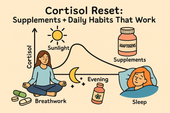
Cortisol Reset: Supplements + Daily Habits That Work
-
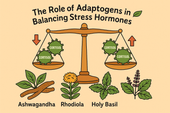
The Role of Adaptogens in Balancing Stress Hormones
Adaptogens work at the root of stress — your nervous system. 🌿 Learn how these powerful herbs help regulate cortisol, calm your nerves, and restore balance between energy and relaxation. ✨
-
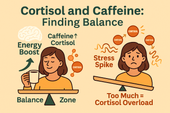
Cortisol and Caffeine: How Much Is Too Much?
Caffeine can boost energy and focus — but too much can overstimulate your stress hormones. ☕ Learn how caffeine affects cortisol, energy levels, and mood, and discover how to find the perfect balance for lasting calm and clarity. 🌿
-
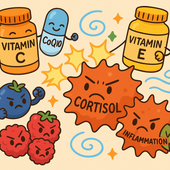
Antioxidants for Stress Management and Cortisol Control
When stress overwhelms your body, antioxidants come to the rescue. 🌿 Learn how vitamin C, CoQ10, and other natural compounds help reduce oxidative stress, regulate cortisol, and restore calm energy from within. ✨
-
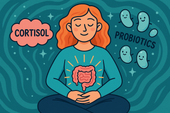
Cortisol and Gut Health: How Probiotics May Help
Chronic stress doesn’t just affect your mind — it changes your gut. 🌿 Learn how cortisol disrupts the microbiome and how probiotics can help restore balance, improve digestion, and calm your stress response naturally. ✨
-

Vitamin D and Cortisol: Supporting Immune Balance
Vitamin D does more than strengthen bones — it helps regulate cortisol and support immune balance. 🌞 Learn how this essential hormone-like nutrient restores calm, improves mood, and strengthens your body’s natural stress defenses. 🌿
-
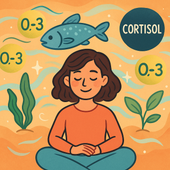
Omega-3s and Cortisol: Fighting Inflammation Naturally
Omega-3s are more than heart-healthy fats — they’re natural cortisol regulators. 🌿 Learn how EPA and DHA help reduce chronic inflammation, calm the nervous system, and support stress recovery from the inside out. ✨
-
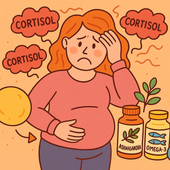
High Cortisol and Belly Fat: Can Supplements Help?
Chronic stress can make belly fat harder to lose — but supplements like ashwagandha, magnesium, and omega-3s may help restore cortisol balance. 🌿 Learn how science-backed nutrients support fat metabolism, calm your stress response, and bring your body back into harmony. ✨
-
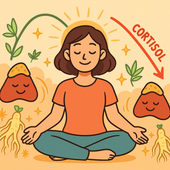
How Ginseng Can Support Energy and Cortisol Balance
Ginseng is one of nature’s most powerful adaptogens, helping your body handle stress without burning out. 🌿 Learn how this ancient root supports balanced cortisol, steady energy, and sharper focus — restoring vitality naturally and sustainably. ✨
-
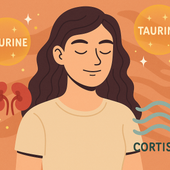
Taurine and Cortisol: Supporting Focus Under Stress
When cortisol surges, focus fades — but taurine helps restore balance. 🌿 Learn how this powerful amino acid calms your nervous system, regulates stress hormones, and sharpens concentration without jitters or fatigue. ✨
-
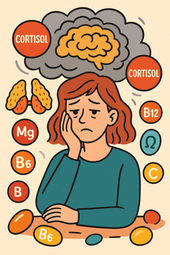
The Link Between Cortisol, Brain Fog, and Nutrient Deficiencies
When brain fog sets in, it’s not just in your head — it’s in your hormones. 🌿 Discover how cortisol imbalance and nutrient deficiencies like low magnesium, B vitamins, and omega-3s can cloud your focus and how restoring balance brings back mental clarity and calm. ✨
-
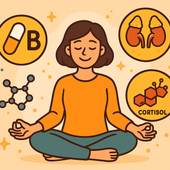
B Vitamins for Stress, Energy, and Cortisol Regulation
B vitamins are the foundation of stress resilience and steady energy. 🌿 Learn how this essential group of nutrients helps regulate cortisol, restore focus, and keep your nervous system calm — giving you balance from the inside out. ✨
-

Cortisol Imbalance and Chronic Fatigue: Can Supplements Help?
When chronic stress keeps cortisol high, fatigue and brain fog follow. 🌿 Learn how to rebalance your stress hormones naturally with calming nutrients, adaptogens, and lifestyle rituals that restore energy, focus, and inner peace. ✨
-

Adaptogen Stacks for Better Sleep and Lower Stress Hormones
Adaptogens can help your body recover from stress and sleep better by regulating key hormones like cortisol and adrenaline. 🌿 Learn how adaptogen stacks work to restore balance, calm the mind, and rebuild resilience — so you can rest deeply and wake renewed. ✨
-

Phosphatidylserine for Nighttime Cortisol Control
When stress hormones stay high at night, deep rest becomes impossible. 🌙 Discover how phosphatidylserine helps calm the brain, reduce nighttime cortisol, and restore healthy sleep rhythms — so you can wake up peaceful, clear, and recharged. ✨
-

Magnesium for Stress Relief and Cortisol Reduction
Magnesium is one of the most powerful natural tools for stress relief. 🌿 This essential mineral calms your nervous system, lowers cortisol, and helps your body recover from chronic tension. Learn how magnesium replenishes balance, improves sleep, and restores inner peace — naturally. ✨
-

Supplements to Improve Sleep by Balancing Cortisol
When cortisol stays high at night, sleep becomes a struggle. 🌙 Discover natural supplements that calm the nervous system, lower stress hormones, and restore your body’s natural rhythm. From magnesium and ashwagandha to L-theanine and phosphatidylserine, learn how to build deeper, more restorative rest. 🌿
-

Cortisol and Sleep: Why Stress Keeps You Awake
When stress keeps your body in fight-or-flight mode, cortisol refuses to calm down — and sleep becomes impossible. 🌙 Learn how elevated cortisol disrupts your circadian rhythm, suppresses melatonin, and turns restless nights into exhaustion. Discover how to restore balance and reclaim deep rest. ✨
-

L-Theanine for Cortisol Balance and Anxiety Relief
L-Theanine — the calming amino acid from green tea — helps quiet the mind and balance cortisol, the body’s key stress hormone. 🌿 Learn how it promotes calm focus, eases anxiety, and supports deep rest without sedation, backed by modern research and centuries of tradition. ✨
-

Rhodiola Rosea and Stress Resilience: A Natural Cortisol Regulator
Rhodiola rosea is one of nature’s most powerful tools for resilience. 🌿 This Arctic root helps balance cortisol, fight fatigue, and sharpen focus — keeping you calm yet energized even under stress. Discover the science behind Rhodiola’s adaptogenic power and how it helps your body thrive under pressure. ✨
-

Ashwagandha for Cortisol Balance: What the Science Says
Ashwagandha helps your body recover from chronic stress by calming the adrenal system and balancing cortisol — your key stress hormone. 🌿 Learn what science says about this powerful adaptogen, how it restores energy and focus, and why it’s one of nature’s most effective tools for modern stress relief. ✨
-

Supplements That Naturally Lower Cortisol Levels
When cortisol levels calm, your energy transforms — no more crashes or jitters, just steady focus and inner peace. 🌿 Learn which natural supplements and habits lower stress hormones, boost calm energy, and help your body thrive with balance instead of burnout. ✨
-

What Is Cortisol Imbalance? Symptoms You Shouldn’t Ignore
Cortisol — your body’s main stress hormone — keeps you alert and energized, but when it’s out of balance, it can drain your health. 🌿 Learn the signs of cortisol imbalance, from fatigue and anxiety to sleep disruption and stubborn weight gain, and discover how to restore calm, energy, and hormonal harmony naturally. ✨
-

The Best Daily Multivitamins for Menopausal Women
Menopause brings new nutritional needs that your old vitamin routine may no longer meet. 🌿 Discover how the right daily multivitamin can boost energy, balance mood, support bone and heart health, and keep your skin glowing. Learn which nutrients truly matter — from vitamin D to magnesium and B12 — to feel strong and vibrant every day. ✨
-

Antioxidants and Menopause: Fighting Inflammation Naturally
During menopause, oxidative stress and inflammation can quietly accelerate aging, fatigue, and skin changes. 🌿 Learn how antioxidants — from vitamins C and E to polyphenols in berries and green tea — help neutralize free radicals, reduce inflammation, and restore balance naturally. Discover the science of radiant, resilient aging. ✨
-

How CoQ10 Supports Heart Health After Menopause
After menopause, heart health becomes more important than ever. ❤️ Discover how CoQ10 — your body’s natural energy molecule — supports cardiovascular strength, restores vitality, and protects against oxidative stress. Learn how this essential nutrient helps keep your heart energized, balanced, and resilient through every stage of life. 🌿
-

Collagen Supplements for Skin and Joint Health Post-Menopause
After menopause, collagen loss affects both skin elasticity and joint comfort — but supplements can help rebuild from within. 🌸 Learn how collagen peptides, vitamin C, and other nutrients work together to restore firmness, reduce stiffness, and keep you glowing and mobile well into your next chapter. ✨
-

Calcium and Vitamin D: Protecting Bone Health in Menopause
Menopause brings hormonal changes that can weaken bones—but with the right nutrients, strength and stability can be rebuilt. 🦴 Learn how calcium and vitamin D work together to protect bone density, prevent fractures, and keep your body resilient. This guide explores nutrition, sunlight, and lifestyle habits that help your bones stay strong and vibrant for years to come. ☀️💪
-

Adaptogens for Energy and Resilience During Menopause
Feeling drained or emotionally scattered during menopause? 🌿 Discover how adaptogenic herbs like Ashwagandha, Rhodiola, and Ginseng can restore energy, balance cortisol, and build emotional resilience. Learn how these natural allies work with your body—not against it—to help you stay strong, focused, and calm through life’s hormonal changes. 🌸
-

Supplements That Help Beat Menopause Fatigue
Menopause fatigue can feel like more than tiredness—it’s a total energy crash. This guide explores how specific supplements, mindful breathwork, and therapy can help restore balance. Learn how nutrients like B vitamins, magnesium, and adaptogens rebuild your stamina, while breathwork and emotional healing calm your nervous system and bring vitality back to your days. 🌿✨
-

Herbal Blends for Menopausal Restlessness: Finding Calm in Transition
Herbal blends bring the wisdom of nature into moments of rest and renewal. Discover how soothing herbs like chamomile, lemon balm, and ashwagandha work together to calm menopausal restlessness, balance hormones, and invite deep relaxation. 🌿💫
-

Magnesium + Glycine for Deep Sleep During Menopause
Nutrients like magnesium, glycine, and B vitamins form the foundation for deep, restorative sleep during menopause. Discover how these natural compounds calm your nervous system, balance hormones, and help you wake up refreshed and recharged. 🌿💤
-

Melatonin and Menopause: Restoring Your Sleep Cycle
Nutrients are the foundation of hormone balance and energy. Learn how vitamins, minerals, and whole foods like greens, salmon, and berries nourish women’s bodies during menopause and beyond — restoring vitality, mood, and strength. 🌿🥗
-

How L-Theanine Helps With Menopausal Anxiety
Science continually deepens our understanding of the human body, from hormones to neurotransmitters. Discover how evidence-based research shapes modern wellness — bridging natural medicine, neuroscience, and hormone balance for healthier living. 🔬🌿
-

Can Ginkgo Biloba Improve Memory in Menopausal Women?
Hormone therapy can be a powerful tool for easing menopause symptoms and restoring balance. Learn how it works, the types available, and how to combine it safely with lifestyle and natural support for optimal well-being. 🌸💊
-

B Vitamins for Mental Clarity During Menopause
Nutrients are the foundation of mental and physical balance during menopause. Discover how vitamins, minerals, and whole foods like leafy greens, fish, nuts, and citrus can fuel energy, clarity, and calm while supporting hormonal health. 🌿✨
-

Mood Swings and Menopause: Natural Nutrient Support
Probiotics do more than support digestion — they help balance mood, hormones, and immunity too. Learn how a healthy gut microbiome can ease menopause symptoms, boost energy, and improve emotional resilience naturally. 🌿🦠
-

Brain Fog in Menopause: Supplements That May Help
Supplements can be powerful allies in restoring balance, energy, and focus—especially during menopause. Learn how nutrients like omega-3s, vitamin D, magnesium, and herbal adaptogens work together to support brain health, reduce stress, and promote lasting vitality. 🌿💊
-

Adaptogen Stacks for Reducing Night Sweats
Hormone detox isn’t about cleansing your body—it’s about restoring flow. Learn how the liver, gut, and endocrine systems work together to eliminate hormone buildup and how herbs like milk thistle, dandelion, and schisandra support balance, clarity, and natural vitality. 🌿💫
-

Cooling Menopause Symptoms with Herbal Support
Ashwagandha is one of nature’s most powerful adaptogens, helping women manage stress, sleep better, and balance hormones naturally. Discover how this ancient root supports calm energy, emotional resilience, and relief from menopause-related anxiety and fatigue. 🌿💫
-

Evening Primrose Oil and Menopause: What the Research Says
Hot flashes are one of the most common—and frustrating—symptoms of menopause. Discover what causes them, why the body’s “internal thermostat” becomes unbalanced, and the natural supplements and lifestyle shifts that can help you cool down, rest better, and feel more in control. 🔥💧
-

How Black Cohosh Helps with Menopausal Symptoms
Sleep disturbances are among the most exhausting symptoms of menopause—but they don’t have to rule your nights. Discover how natural strategies and calming supplements can help you fall asleep faster, stay asleep longer, and wake up feeling truly restored. 🌙💤
-

Natural Supplements That May Reduce Hot Flashes
Hot flashes can disrupt sleep, confidence, and daily comfort—but natural relief is possible. Discover the best research-backed supplements like black cohosh, red clover, and licorice root that may reduce hot flashes, balance hormones, and restore inner calm during menopause. 🌿💫
-

Omega-3s and Menopause: Supporting Mood and Inflammation
Omega-3 fatty acids are essential for hormonal harmony, brain function, and emotional balance—especially during menopause. Learn how these healthy fats reduce inflammation, support heart health, and restore calm, vitality, and focus through every stage of midlife. 🌊💫
-

The Role of Vitamin D in Menopausal Health
Vitamin D plays a powerful role in menopausal health—supporting bone strength, hormone balance, and mood stability. Discover how optimizing your vitamin D levels can improve sleep, energy, and emotional well-being while protecting long-term vitality through every stage of menopause. 🌞💪
-

Magnesium for Menopause: Relaxation, Sleep, and Hormonal Support
Self-regulation is the art of staying calm, centered, and in control—no matter what life throws your way. Learn how to strengthen emotional balance, manage stress responses, and cultivate inner peace through mindful techniques that reconnect your heart, body, and brain. 🌿💫
-

Can Adaptogens Like Ashwagandha Ease Menopausal Symptoms?
Brain fog during menopause can make even simple tasks feel overwhelming—but you’re not losing your sharpness, your hormones are simply shifting. Discover how adaptogens like ashwagandha and key nutrients can restore mental clarity, balance cortisol, and bring calm focus back to your day. 🌿🧠
-

Supplements That Support Hormonal Balance During Menopause
Herbal supplements have supported women’s health for centuries—and modern science is finally catching up. From ashwagandha and maca to red clover and rhodiola, discover how nature’s most trusted herbs can calm stress, balance hormones, and enhance energy through every life stage. 🌿✨
-

The Ultimate Motivation Stack: Supplements That Work Together
Discover how therapy helps restore motivation, focus, and emotional balance alongside supplement and mindset strategies. This empowering article explores how addressing thought patterns and emotional blocks through therapy can complement biochemical tools for long-term drive and well-being. 🧠💬

















































